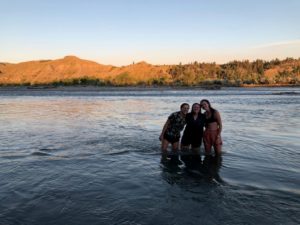
The harsh light of the Exxon Mobil conference room is unforgiving. I try to focus on the company spokesperson’s overview of the refinery’s production. The Billings refinery turns crude oil from Canada into gasoline for the Western states. It refines 60,000 barrels a day in a maze of pipes and tanks using chemicals, steam and pressure.
It is Day 2 of Cycle the Rockies 2021. We are a group of nine students traveling from Billings to Glacier National Park—700 miles—by bike. We are talking to local experts and activists as we explore issues of energy and climate change in Montana.
We have been in the sun since dawn and I find the conference room lighting garish and distracting. I hope the spokesman will turn off the glaring lighting when we start the refinery safety video. He doesn’t.
We spent the first three nights of our course at a small ranch on the Yellowstone River near Billings—the same river whose waters cool the fuels produced at the refinery.
On this trip, our days are controlled by sunlight. I have been opening my eyes just before 5:00 a.m. as the sunrise shines through our tents. The soft sun has kept us awake as we make breakfast and pack for the day. In the evenings, we have chased the sunset after dinner to the Yellowstone River, drinking in unscheduled time and the fading day. The sunsets are dark pink fading to orange, an easy transition into night.
The days here are long, longer than the ones I’ve known in Texas, and they feel fuller. Going to sleep and getting up with the sun has made it easy to fall into a purposeful rhythm.
The refinery is a maze of pipes animated by steam. It looks hot. We are starting our conversations on course with fossil fuels because they contribute the bulk of our global greenhouse gas emissions. The oil from this refinery is distributed across the Rocky Mountain region, helping to meet current energy demands.
To address climate change, we will need to replace fossil fuels as an energy source. The refinery is a stark reminder of the heavy reliance our communities have on oil. Our conversations about how to move away from fossil fuels need to begin with the recognition of the role they play in today’s society.
At the ranch, we paced off 255 million years of geologic time. With our bodies, we modeled in long strides the time it took oil to form from ancient sea beds. Each step was one million years. The time people have been consuming fossil fuels was reflected in far less than a foot — maybe just a toe.
At the refinery, I have a powerful sense that something unnatural is going on. The lights in the conference room are too bright. The refinery is an unnatural jungle of metal. Something of the earth is brought here and changed into products we have built our lives around.
Later, a conversation about energy-conscious strategies helps me understand what I was feeling at the refinery. We often confuse our technologies with the services they provide. The refinery makes gasoline for cars. But we don’t need gasoline, we need to get to our destinations. We don’t need lightbulbs, we need light.
I sit and reflect on our energy needs in the conference room of a sustainable architect. No lights are on in the building, yet I can see clearly. The sun is streaming in from large windows. Awnings cut the glare. It is cool. I feel at ease. My needs are met, but the lights are not on. In our first few days we are already shedding light on the way we think about how we might meet the different needs of our society.
Delaney Harris is from Austin, TX and is currently a senior at Texas A&M University.